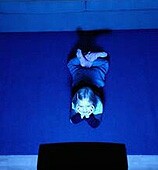- Are You Making This Expensive Thermostat Error This Winter?
- Recognizing the Signs of Hypothyroidism
- 10 Strategies to Overcome Insomnia
- Could Artificial Sweeteners Be Aging the Brain Faster?
- Techniques for Soothing Your Nervous System
- Does the Water in Your House Smell Funny? Here’s Why
- Can a Daily Dose of Apple Cider Vinegar Actually Aid Weight Loss?
- 6 Health Beverages That Can Actually Spike Your Blood Sugar
- Treatment Options for Social Anxiety Disorder
- Understanding the Connection Between Anxiety and Depression
TV in Child’s Bedroom Tied to Weight Gain


Children who have a TV in their bedroom are likely to gain weight. But kids who play active video games might lose unwanted pounds, according to two new studies.
“In an age of widespread childhood and adolescent obesity, technology is clearly the proverbial double-edged sword,” said Dr. David Katz, director of the Yale University Prevention Research Center.
“On the one edge, technological innovation and screen time, in particular, is associated with sedentariness and weight gain,” said Katz, who had no part in either study. “But then there is the other edge: Technology can be used to encourage activity.”
In other words, not all video games are bad, said Stewart Trost, a professor of physical activity and health at the University of Queensland in Australia. Trost was the lead author of the video game study published online March 3 in the journal JAMA Pediatrics.
“The latest and greatest active video games that require players to move their whole body are an appealing way to promote exercise among overweight and obese children,” Trost said.
His study of 75 overweight or obese children — their average age was 10 — found that those assigned to active gaming plus family-based weight management increased their moderate-to-vigorous activity an average of 7.4 minutes per day and vigorous physical activity by nearly three minutes per day.
The active gamers lost about twice as much weight over four months as those assigned to a weight-management program alone — 10.9 percent of body weight versus 5.5 percent, the researchers found.
Children in the weight-management-only group saw no change in calorie-burning activity, said the researchers, who received no funding from the video game industry.
More than one-third of children and adolescents in the United States are overweight or obese, putting them at risk of serious health problems as they grow older, the researchers said.
Anything that gets children moving is a good thing, said Dr. William Muinos, co-director of the division of gastroenterology at Miami Children’s Hospital in Florida. “Having these active games gives obese kids another avenue of activity,” said Muinos, who was not involved in either study.
Moreover, active video games can help obese kids get past the stigma they encounter trying to play team sports, said Muinos, who runs an obesity clinic.
But bedroom TVs are another matter entirely, he and other experts say.
A study of more than 6,500 middle-school-age kids, published in the same journal issue, found that those with a TV in their bedroom “gained about one extra pound a year,” said lead author Diane Gilbert-Diamond, an assistant professor of community and family medicine at Dartmouth Medical School. This held true whether or not the kids watched a lot of TV.
“Removing a TV from a child’s bedroom is a single concrete action that a parent can take to help reduce their child’s risk of excessive weight gain,” Gilbert-Diamond said.
The researchers said they don’t know the exact reasons for the weight gain but they offered two possibilities: greater exposure to food advertising and disrupted sleep patterns, including later bedtimes and poorer sleep quality.
Muinos, who runs an obesity clinic, supported the disrupted-sleep theory. “It’s well known that kids who continue to watch TV while the parents are already in bed will have disrupted sleep patterns,” he said. “We know that increases weight.”
“When kids have TV in the bedroom, they isolate themselves from the family,” he added. “They tend to go to bed later. They tend to be less active. They tend to snack on junk food. All of this will increase weight.”
Gilbert-Diamond’s survey asked more than 6,500 boys and girls aged 10 to 14 if they had a television in their bedroom. Two to four years later, their parents were asked about their kids’ height and weight.
Fifty-nine percent of the children had a bedroom TV, and they were more likely to be boys, poor and black or Hispanic, the study found.
At both two years and four years after the survey, having a bedroom TV was associated with an increase in body-mass index (BMI) of nearly one point. BMI is a measurement of body fat based on height and weight.
More information
For more information on childhood obesity, visit the U.S. National Library of Medicine.
Source: HealthDay
Copyright © 2026 HealthDay. All rights reserved.










